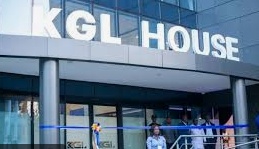Business News of Wednesday, 16 April 2025
Source: www.ghanawebbers.com
KGL is the most accomplished LMC in Africa

KGL Technology operates the 5/90 lottery online for the National Lottery Authority (NLA). This partnership generates over 250 million Ghana cedis annually. It does so at no cost or risk to the NLA.
History of Online Lottery in Ghana
The NLA has faced challenges with online lottery operations. High capital investments and cybersecurity threats have hindered progress. Since 2006, we have tracked digital lottery developments in Africa, including Ghana.
In 2006, the NLA partnered with Simnet Ghana Limited. They introduced automation machines that generate lottery tickets via GPRS. Initially, retailers and lotto stalkers were slow to accept this change from manual systems.
The shift to automation was necessary due to fraud issues. The first automated system used TPM machines operated by Simnet until 2009. Then, the NLA introduced Portable Automation Machines to phase out manual processes.
The PADPM machine was specifically designed for the NLA's needs. Both TPM and PADPM operated together until October 2012 when TPM shut down. Afterward, Lots-Services Ghana Limited began providing technical support alongside INGENICO.
In 2008, the NLA launched an online operation called Mobi Game 2 Two via MTN Short Codes. However, it failed after significant investments by the NLA.
During COVID-19 lockdowns in 2019-2020, the NLA revived its digital operations through TekStart Afrika Limited using *890#. Unfortunately, infrastructural challenges led to its suspension.
In response, KGL Technology Limited joined forces with the NLA in 2019. They established a Public-Private Partnership without financial costs to the NLA. KGL paid Ten Million Ghana Cedis as a penalty for testing *959# Short Code.
In May 2019, KGL submitted a business proposal for operating the lottery online. After six months of review, they received a provisional license for two years. This cautious approach stemmed from previous failures of digital lottery attempts by the NLA.
Since then, KGL has made no IT infrastructure investments on behalf of the NLA. After their provisional license expired, a ten-year agreement was signed with KGL for continued operations.
This new agreement increased financial responsibilities on KGL while protecting both parties from losses. So far, KGL has met all financial obligations under their contract with the NLA.
KGL Technology provides more benefits to the NLA than any other licensed company since 2019. Unlike others licensed by the NLA, KGL does not conduct its own Lotto Draws but uses results provided by them.
KGL has successfully operated under two Director-Generals and Boards of Directors at the NLA since its inception in 2019. They work solely in state interests and are not aligned with any political party.
Nature of Private Business Operations at NLA
Research shows that since its establishment, all revenue-generating operations at the NLA involve private entities:
1. Lotto Marketing Companies: These companies sell lottery products on behalf of the NLA for a commission.
2. Technical Service Providers: Companies like Lots-Services Ghana Limited manage Point of Sale Terminals (POSTs) for the NLA.
Many Lotto Marketing Companies have worked with the NLA for over 25 years without issues.
Unlike KGL Technology, other providers take up to six percent from daily transactions creating debts for the authority.
Due to agreements between Veterans Administration Ghana (VAG) and LNA regulations exist around licensing private operators independently.
Thus claims about "deliberate private capture" are unfounded given these operational realities.
Conditions for Operating Online Lottery
To run digital lottery marketing operations effectively:
1. Technology Implementation: A secure digital management system is essential.
2. Ticket Sales and Distribution: Access through web and mobile apps must be enabled.
3. Regulatory Compliance: Adherence to national laws and international standards is crucial.
4. Security Measures: Advanced security protocols must be implemented against fraud.
5. Disaster Recovery Plans: Systems should ensure minimal downtime during failures.
KGL Technology meets all these requirements and holds ISO/IEC 27001 certification—an achievement unmatched by local competitors.
Research indicates that nearly ninety percent of annual revenue comes from KGL’s contract with LNA since their partnership began in 2021.
Without these contributions from KGL Technology, paying staff salaries would be challenging for LNA today.
Additionally, KGL supports various programs through marketing efforts and infrastructure development like refurbishing Brennan Hall.
Conclusion
All parties involved are legally bound by their agreements; breaches should go through proper legal channels rather than seeking redress elsewhere.
The partnership between LNA and KGL has helped generate substantial revenue without risks or costs to government resources.
It also combats illegal lotteries while promoting government policies on digitization.
These recent employee agitations echo past misinformation campaigns aimed at discrediting improvements within LNA.
Ultimately, growth within LNA benefits all Ghanaians as it serves public interests rather than just private ones.
Any entity delivering value should be welcomed into this sector.
Credit: Digital Public Policy Forum










